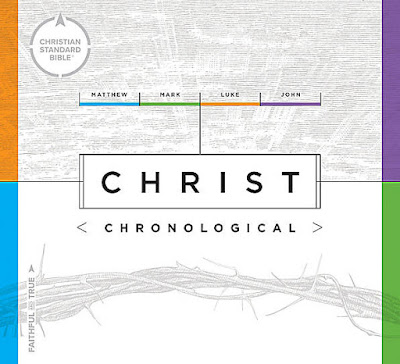This book,"Christ: Chronological" is a sort of chronological parallel Bible. Using the Christian Standard Bible translation the Gospel accounts, written by Matthew, Mark, Luke and John, are arranged in a chronological order and they are placed alongside each other in parallel columns when dealing with the same account. The text from each Gospel is in a different color, blue for Matthew, Green for Mark, a reddish color for Luke and purple for John. Along the very bottom of each page is a 'color code' key as it were, reminding you which color represents each Gospel.
Very nicely bound (a hardcover book, and wider than a typical Bible - it's in a square shape), the book lies quite flat when opened, so you can easily lay it down on a table while reading it without keeping one hand on it to make sure that the pages won't turn on their own. The font is easy to read, a good size, and also, despite the font being various colors, they are bold colors and so stand out on the page.
The book is divided into a sort of chapter format, though they are not called chapters and are not numbered. The 'chapters' have main titles like "Jesus Turns His Focus Toward Judea". Within each 'chapter' are many 'sections' some of which have descriptive headings for sections within the 'chapters', and above each section are the chapter and verse references for the Scriptures within them. There are many short introductory notes that begin parts that have parallel accounts. These notes comment on apparent differences between the accounts and offer suggestions as to how they are actually complementary. The font size of these notes is small enough that you can just glance over them, if you'd like, and continue reading the Scriptural account of the life of Christ. The flow of the Gospel account is a bit choppy, with the many section headings throughout and then single columns breaking off into four columns of varying lengths and then back again to one…etc. It is still very readable though, and serves its purpose well.
It is always interesting to compare the Gospel accounts, to see how they complement one another, how some of the accounts give more detail than others who focus more on particular details. All in all they form quite the picture of our Lord's sacrificial life, His teachings, His death and His resurrection. This book is a nice way to read all of the accounts together.
Many thanks to the folks at B&H publishing for sending me a free review copy of this Bible (My review did not have to be favorable)!
My Rating: Five out of Five Stars
*****
This book may be purchased at Amazon.com and Christianbook.com


/F-cover/without%20spine/9781600668029.jpg)


